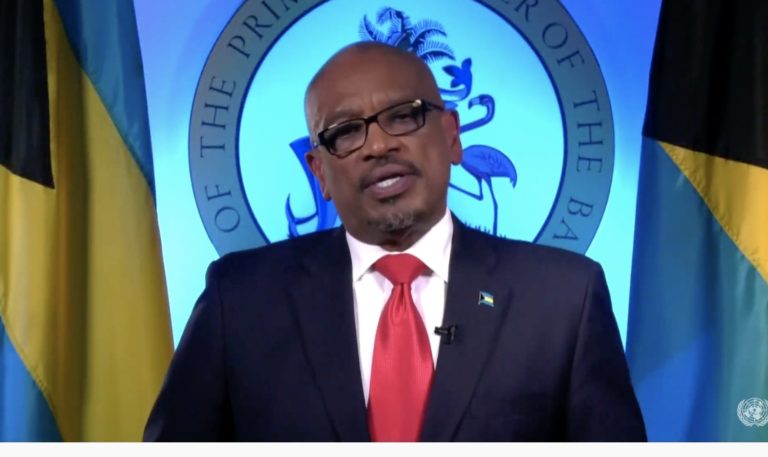NASSAU, BAHAMAS — Prime Minister Dr Hubert Minnis called into question the use of “outdated methodologies” to assess middle-income countries as he highlighted the “vicious recovery mode cycle” faced by small-island states during an address to the United Nations General Assembly (UNGA).
Normally held at the UN’s New York offices, the 75th annual session of the UNGA is being hosted virtually this year due to the COVID-19 pandemic.
In a video address today, the prime minister said the assessments by international financial institutions give no consideration to a country’s level of exposure, vulnerability and ability to recover from exogenous shocks.
He maintained small-island states are under constant assault from external shocks beyond their control, including Caribbean countries, which he said were among the most disaster-prone areas in the world.
Minnis said: “Hence the compelling question remains, as to why middle-income countries are still being assessed by international financial institutions using outdated methodologies that give no consideration to a country’s level of exposure, vulnerability and ability to recover from exogenous shocks.
The prime minister further noted COVID-19 impact estimates indicate that developmental achievements in the Caribbean and Latin America have been reversed by at least a decade.
“World Bank projections point to at least 100 million people falling into extreme poverty,” he said.
“I therefore reiterate the call for the institutionalization of a vulnerability index in the decision-making processes of the international financial institutions and international donor community. I also echo the call of the region for the capitalization of a Caribbean Resilience Fund.”
Minnis pointed to the decision of the G20 group to suspend debt service payments for the least developed countries.
He said the concession is commendable, and called for it to be extended to other economic groupings.
The prime minister acknowledged the assembly has convened at a time when the world is still reeling from the “seismic-level” shocks the virus has unleashed on the global community.
He furthered the pandemic has triggered an unprecedented crisis that has halted global economic activity and threatened global public health and social well-being, as he expressed solidarity with member states.
Minnis reflected on his charge to the global community on the heels of Hurricane Dorian last year.
At the time, he urged world leaders to treat the global climate emergency as the greatest challenge facing humanity.
“Little did we know that just a few months later, an even greater challenge would emerge, forcing the world to come to a grinding halt, at a proportion not witnessed since the Second World War,” he said.
Minnis underscored the impact of the virus — and subsequent border shutdown — on the tourism sector as the country’s primary economic engine.
He said the temporary closure has caused one of the largest declines in visitors since the advent of the modern tourism model.
Minnis also noted the knock-on effect the slowdown in economic activity has had on the private sector, ushering in an unprecedented increase in unemployment and social need.
He pointed to the efforts of the National Food Distribution Program, the largest feeding program in the country’s history.
Minnis said: “Small island developing countries like The Bahamas always appear to be operating in a vicious recovery mode cycle, having to deal with successive exogenous shocks and climatic events.”
He pointed to successive major hurricanes, and the $3.4 billion in loss and damage incurred due to Dorian — the largest Atlantic storm in recent history.
In January, the UN Development Programme (UNDP) coordinated a Donors Conference with more than $1.5 billion pledged in aid.
Earlier this month, Iram Lewis, minister of state for disaster preparedness, management and reconstruction, revealed the country has received just $364,000 in cash donations.
During his address, Minnis expressed the government’s appreciation for all of the pledges of financial resources and assistance made at the conference.
“My government looks forward to the full realization of the pledges made as they are essential to our ongoing recovery efforts,” he said.
As for the COVID-19 fight, Minnis said the country remains cautiously optimistic for a viable vaccine in the “not too distant future”.
Pointing to the collaborative efforts of the COVAX facility to secure arrangements for developing countries, the prime minister maintained developing countries should be able to access vaccines via a transparent procurement process at affordable market rates.
He saluted frontline workers as “real heroes”, who have sacrificed their own health in order to assist tens of millions of people around the world.
Minnis said the country was still formulating the gradual re-opening of The Bahamas to visitors, adding it hoped to welcome “some tourists” this year.
He furthered that no country can survive this pandemic alone, and reiterated the country’s support for an end to the economic, commercial and financial embargo against Cuba.
Minnis said The Bahamas will join the international community by voting in favor of the General Assembly’s annual resolution on this agenda item.
During his address, the prime minister also highlighted unprecedented global climatic and environmental challenges, specifically the decline of 85 percent of viable wetlands worldwide.
He welcomed the scheduling of a Biodiversity Summit on September 30, and expressed the country’s commitment to its role in the preservation of a healthy marine and land environment through expansion of marine protected areas and heritage sites.
Minnis added that the country will seek to renew its membership on the Council of the International Maritime Organization.


